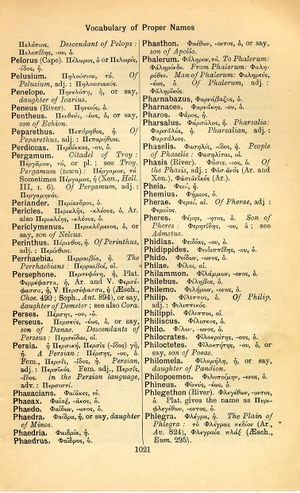Philomela: Difference between revisions
δήλωσιν ποιούμενος ὅτι ὁ ἐντυγχάνων τοῖς τε λίθοις καὶ τοξεύμασι διεφθείρετο → intimating that it was a mere matter of chance who was hit and killed by stones and bow-shots
m (Text replacement - "}}]]" to "}}]]") |
m (Text replacement - "(|thumb)\n(\|link=)" to "$1$2") |
||
| Line 1: | Line 1: | ||
{{WoodhouseENELnames | {{WoodhouseENELnames | ||
|Text=[[File:woodhouse_1021.jpg|thumb | |Text=[[File:woodhouse_1021.jpg|thumb|link={{filepath:woodhouse_1021.jpg}}]]Φιλομήλη, ἡ, or say, <b class="b2">daughter of Pandion.</b> | ||
|link={{filepath:woodhouse_1021.jpg}}]]Φιλομήλη, ἡ, or say, <b class="b2">daughter of Pandion.</b> | |||
}} | }} | ||
{{Lewis | {{Lewis | ||
Revision as of 17:00, 18 May 2020
English > Greek (Woodhouse)
Φιλομήλη, ἡ, or say, daughter of Pandion.
Latin > English (Lewis & Short)
Phĭlŏmēla: ae, f., = Φιλομήλη.
I Lit., daughter of Pandion, king of Athens, and sister of Progne; she was violated by her brother-in-law, Tereus, and was changed into a nightingale: respondeo, Natas ex Philomelā atque ex Progne esse hirundines, Plaut. Rud. 3, 1, 12; Hyg. Fab. 45; Ov. M. 6, 424 sq.; Verg. E. 6, 79 Serv.; Mart. 14, 75, 1.—
II Transf., the nightingale (poet.), Verg. G. 4, 511.—
B The swallow: mortalium penatibus fiducialis nidos philomela suspendit, Cassiod. Var. 8, 31.—
C The name of a play, Juv. 7, 92.
Latin > French (Gaffiot 2016)
Phĭlŏmēla,¹³ æ, f. (Φιλομήλα), Philomèle [fille de Pandion, enlevée par Térée, son beau-frère, fut changée en rossignol] : Ov. M. 6, 424 || [poét.] = rossignol : Virg. G. 4, 511.
Latin > German (Georges)
Philomēla, ae, f. (Φιλομήλα), I) Tochter des athenischen Königs Pandion, von Tereus, dem Gemahle ihrer Schwester Prokne, entehrt u., damit die Schandtat unentdeckt bliebe, der Zunge beraubt, weshalb Prokne den eigenen Sohn Itys dem Tereus zum Mahle vorsetzte. Als Tereus die Frauen verfolgte, wurde auf ihr Flehen Philomela von den Göttern in eine Nachtigall, Prokne in eine Schwalbe, Tereus in einen Wiedehopf verwandelt, Ov. met. 6, 424 sqq. Mart. 14, 75. – Nach altattischer Sage wird Prokne in die Nachtigall, Ph. in die Schwalbe verwandelt, bei röm. Dichtern zuw. Ph. als Mutter des Itys gen., s. Voß Verg. ecl. 6, 78 sqq. p. 49 sqq. – II) meton., philomēla, ae, f., die Nachtigall, Verg. georg. 4, 511. Cassiod. var. 8, 31, 7: phil. sibilans (zwitschernde), Sidon. epist. 2, 2, 14.

